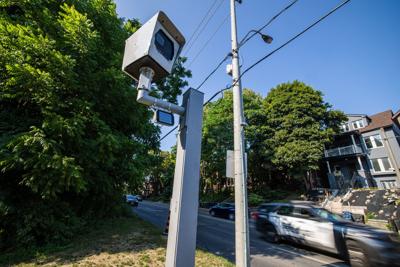The big number
40,000
the hypothetical number of charges the Parkside Drive speed camera could be issuing each month if every driver exceeding 12 km/h over the limit were ticketed. In reality, the camera averages around 2,000 charges a month.
Drivers with a hate on for Toronto’s automated speed camera program like to use two words and an exclamation mark to sum up their opposition: cash grab!
The idea — used by some as a justification for the recent wave of vandalism that saw 16 cameras damaged across the city on a single night — is that the cameras are just unfair, snapping photos and issuing tickets every time a car even sniffs the other side of the posted speed limit.
Critics suggest the cameras are holding drivers to a far harsher standard than a police officer with a radar gun — and are intended to just generate as much fine revenue as possible.
But the data, it turns out, disagrees.
Consider Parkside Drive as an example. The speed camera on that corridor has been cut down seven times over the past year, suggesting that someone really, really hates it.
But while the Parkside camera issued a lot of tickets before the vandalism began, suggests the number of tickets issued by the camera is a small fraction of the tickets it could be.
In other words, if this camera is supposed to be a cash grab, it’s doing a pretty lousy job of grabbing up cash.
Here’s what the math says: During a traffic count conducted between Tuesday, April 29 and Thursday, May 1 this year, the city recorded an average speed of 39.6 km/h. Since the speed limit on Parkside is 40 km/h, that’s good news. The “average driver” is a law-abiding driver.
But there were still lots of speedsters. The city’s data says about 15 per cent of cars were going about seven kilometre an hour or more above the limit. About five per cent of cars were going 12 kilometres an hour or more above the limit.
During this traffic count, the city recorded daily volumes of 27,077 cars. In a hypothetical world where the machines were enforcing 24/7 — the city has said sometimes the machines stop issuing tickets to manage volumes — and some drivers weren’t using illegal plate covers to fool the machines, the cameras would be snapping a lot more often.
If every one of the cars exceeding the speed limit by at least seven kilometres an hour got hit with a ticket, the cameras would be writing more than 4,000 tickets a day, or well over 100,000 tickets a month. Limit the tickets to only the five per cent or so going about 12 over, and they’d be issuing about 1,300 tickets a day, or about 40,000 a month.
Let’s switch back to reality now. The most tickets ever issued in a single month by the Parkside drive camera? Just 3,586, in April 2022 — the very first month it was active. Setting aside the months where vandals with power saws screwed with the data, the camera has averaged about 2,000 tickets per month over its 40-plus months of service.
The real numbers are not even in the same universe as the hypotheticals. They suggest that most months, only about five per cent of speeding cars are getting tickets. Maybe less.
And the cash city hall is supposedly grabbing with these cameras is mostly being left on the table. The city has told me the average fine for a ticket camera infraction is $107.32. That means, in a world where it was logistically possible to issue tickets to every driver clocked over the limit, city hall could have generated more than $500 million from this single camera alone.
Across all 150 cameras in the city, the maximum cash-grabbiest approach could literally generate billions of dollars — enough to finance a new subway line, spruce up every park in the city and maybe even install a giant solid gold raccoon statue at the foot of Yonge Street.
º£½ÇÉçÇø¹ÙÍøpolice released images from a surveillance camera installed to watch over the Parkside camera after it was cut down for the fifth time.
º£½ÇÉçÇø¹ÙÍøpolice released images from a surveillance camera installed to watch over the Parkside camera after it was cut down for the fifth time.
But it’s clear from the data that the intent of the program is not to fund golden idols. Contrary to what some critics believe, there is indeed an undisclosed threshold programmed into the cameras before tickets are issued. They don’t just ticket cars going a click or two over the speed limit. And the city says every photo is reviewed by a provincial offences officer before the ticket is confirmed, so there’s still some human discretion.
And while the data doesn’t really support calling this program a cash grab, it is clear about one thing: this program makes streets safer. Average speeds on Parkside are down more than 10 kilometres an hour since the camera was installed. And a recent study by the Hospital for Sick Children confirmed the city’s automated enforcement program reduced speeds and the proportion of aggressive driving.
These cameras aren’t here to grab cash. They’re here to stop crashes. And they seem to be doing a pretty decent job at that.
Error! Sorry, there was an error processing your request.
There was a problem with the recaptcha. Please try again.
You may unsubscribe at any time. By signing up, you agree to our and . This site is protected by reCAPTCHA and the Google and apply.
Want more of the latest from us? Sign up for more at our newsletter page.





























To join the conversation set a first and last name in your user profile.
Sign in or register for free to join the Conversation